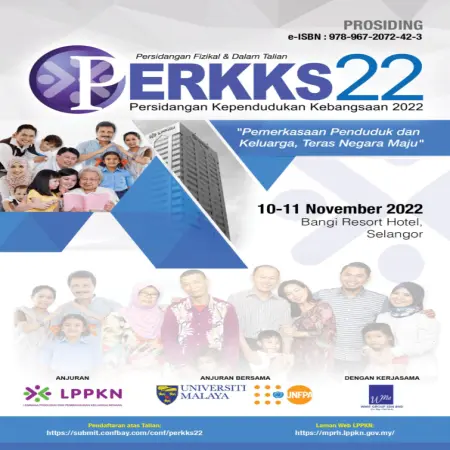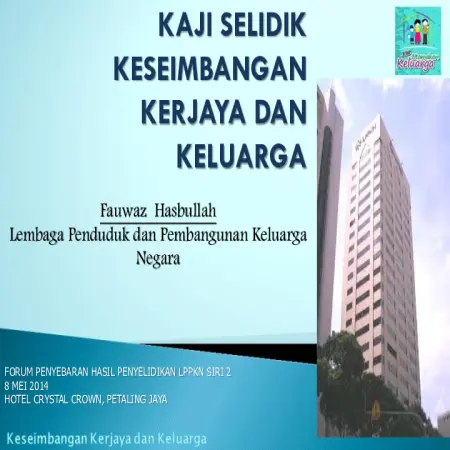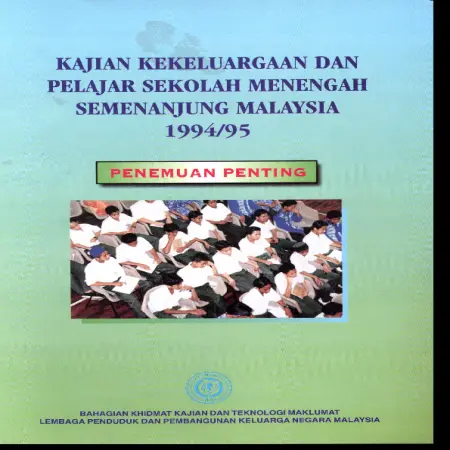TOPICS
Results for Topics : "Adolescent"
|
|
Keperluan kaunseling penduduk muda: kajian di Kuala Terengganu
Item Type: Book Section
Editor:
Year: 00/00/2022
Abstract: The counseling needs of the 21st century are more challenging. There are various issues among the young population that drive the need for new counseling that is very different from the previous era. This clearly shows that the need for counseling also moves along with the era of the modernization of society. As the need for youth counseling evolves, this article will discuss the counseling needs of the young population.
|
|
|
|
|
|
Kajian keseimbangan kerjaya dan keluarga
Item Type: Conference or Workshop Item
Editor:
Year: 00/00/2014
Abstract: The main objective of this study is to investigate the time arrangement between career and family among working peoples. This study leads to identifying the trend of work and family life balance in today’s families. As the result of this study, average time spent by respondent on working hour is 9 hours and 36 minutes per day, 48 hours 3 minutes per week. That duration is approach the result of the International Labor Organization ( ILO ) in 2000 which is Malaysia was ranked the longest spend time for working after South Korea. The findings also obtained the annual leave by respondent was high (26 days per year) compared to some other countries in the world . The duration of travels time to work is not much different in urban areas where respondents took 46 minutes commuting to work and the respondent metro-urban was takes about 55 minutes. This phenomena was influence the time management in their family life daily. The average time of sleep duration about 6 hours 41 minutes. Which is respondent went to sleep at 11:07 pm and wake up at 5:43 am by average. An important aspect of work-life balance is the amount of time a person spends at work. Overall in average in OECD Country, men spend more hours in paid work and the percentage of male employees working very long hours across OECD countries is 12%, compared with less than 5% for women. Finding a suitable balance between work and life balance is a challenge for all employee, especially working parents. The amount and quality of leisure time is important for people’s overall well-being, and can bring additional physical and mental health benefits. A full-time worker in the OECD works 1765 hours a year and devotes 62% of the day on average or close to 15 hours, to personal care (eating, sleeping and others) and leisure (socialising with friends and family, hobbies, games, computer and television use and others).
|
|
|
|
|
|
Kajian Penilaian Modul Pendidikan Kesihatan Reproduktif dan Sosial (PKRS) dalam kalangan Pelatih PLKN
Item Type: Research Report
Editor:
Year: 00/00/2011
Abstract: Adolescents are the future leaders of the country and have a huge influence on the social, economic and political situation of the country. However, with the presence of various social problems that plague teenagers today, it is feared that it will affect their future which in turn is detrimental to the country. The Ministry of Women, Family and Community Development (MWFCD) has taken the initiative by developing the Reproductive and Social Health Education Policy and Action Plan (PKRS) which aims to produce individuals who are knowledgeable and have a positive attitude in the field of reproductive and social health. Under this PKRS program, the National Population and Family Development Board (NPFDB) is one (1) of the agencies that implement the program. In line with the implementation of this policy, the National Service Training Council has agreed with MWFCD's proposal for PKRS to be implemented in PLKN. Following that, NPFDB has implemented one (1) Pre and Post Test Study to trainees to assess the level of knowledge and perception on reproductive and social health before and after the teaching of this PKRS module is conducted. This study also aimed to examine the sexual and reproductive behaviors of trainees.
This study was conducted in 2011 in a cross section on PLKN Trainees aged 17 years and above in selected National Service Training Camps in Malaysia using independent random sampling. The total sample required was 1,038 people. The calculation of this sample size is based on an estimated 31,200 PLKN trainees who are required to attend training using Confidence Interval (95%), Margin of Error (1.5%) and Prevalence of Having Sex Out of Wedlock Among Adolescents (6.5%), (Naing L, 2006). Questionnaires were developed according to the needs and objectives of the study. One-third of the questions of this questionnaire were adapted from an international study, namely the Youth Risk Surveillance Survey, 2011 but adapted according to the objectives of the study and the culture of the community in Malaysia. The method of questionnaire administration was self administered. The scope of the questionnaire covers three (3) domains namely demographic information, knowledge and attitudes towards reproductive and social health as well as adolescent sexual behavior. A total of 1,300 pieces of assessment forms (pre and post -test) were distributed during the first teaching session of the module. Of that number, only 1,063 forms were received for analysis. After the initial analysis was conducted, it was found that there were some questions that were not fully answered by the respondents. Therefore, the data analysis will vary according to the number of participants who answered for each section. In total, a total of 1,063 respondents were successfully covered in 13 training camps nationwide.
The results of the descriptive analysis showed that the respondents consisted of 57.8% male adolescents and 42.2% female. The majority of respondents were aged between 17 to 19 years (95.6%) with a mean age of around 18 years. Based on the ethnic composition, 66.7% are Malays, 15.3% Chinese, 4.2% Indians and 13.8% are other ethnicities including Sabah and Sarawak Bumiputera. Most respondents have SPM education (95.6%) and are unmarried (99.6%).
The overall findings of the study can be summarized that the level of respondents' knowledge on reproductive and sexual health increased significantly (p <0.05) after undergoing the PKRS module with an increase in mean knowledge score of 7.04±2.2 (before undergoing the module) to 9.17±2.1. A total of 71.1% of respondents obtained a score of 9 out of 12 items (75.0%) and above after undergoing the module. There was a significant change in attitudes (p <0.05) on reproductive and social health after undergoing PKRS training. This indirectly shows that this PKRS module seeks to help respondents change their attitudes in a more positive direction.
A total of 10.4% of respondents admitted to having had sex. The mean age of having sex for the first time is about 15 years. 45.5 percent of them had sex with more than one partner. Only 2.1 percent admitted to being sexually attracted to the same sex with 18.2% of them admitting to having had same -sex sex.
|
|
|
|
|
|
Kajian Pendapat Remaja dan Isu Sosial : mencari penyelesaian
Item Type: Research Report
Editor:
Year: 00/00/2010
Abstract: Introduction of Reproductive and Social Health Education Policy and Action of Plan (PKRS) has been developed which aims to produce individuals who are knowledgeable and have a positive attitude in the field of reproductive and social health. Under the PKRS program, the National Population and Family Development Board (NPFDB) has been given the mandate as the main agency in implementing the program. One of the programs is the Life Skills Program for teenagers which uses two (2) modules, namely the Cakna Diri Module (I’m In Control) and the Kesejahteraan Hidup Module. The purpose of this module developed is to improve adolescents' skills in aspects of reproductive health in order to avoid high-risk behaviors that lead to several problems such as premarital pregnancies, sexually transmitted diseases and HIV. Therefore, an opinion poll was conducted to see the general view on social issues of adolescents, especially from the aspect of reproductive health and the implementation of the Life Skills Program for adolescents.
|
|
|
|
|
|
Kajian kekeluargaan dan pelajar sekolah menengah Semenanjung Malaysia 1994/95: penemuan penting
Item Type: Research Report
Editor:
Year: 00/00/1994
Abstract: This report summarized the key findings from the report of Family and High School Students Study conducted by the National Population and Family Development Board (NPFDB) in collaboration with the Ministry of Education, Malaysia in 1994. The study covered a total of 1089 students from levels two to five selected from 91 secondary schools in Peninsular Malaysia. Among the 535 students who were selected from those having a record of misconduct while the other 554 did not have a record of misconduct. This study also includes parents of students selected to obtain status information that can be related to the behavior of the students surveyed.
|
|
|
|







